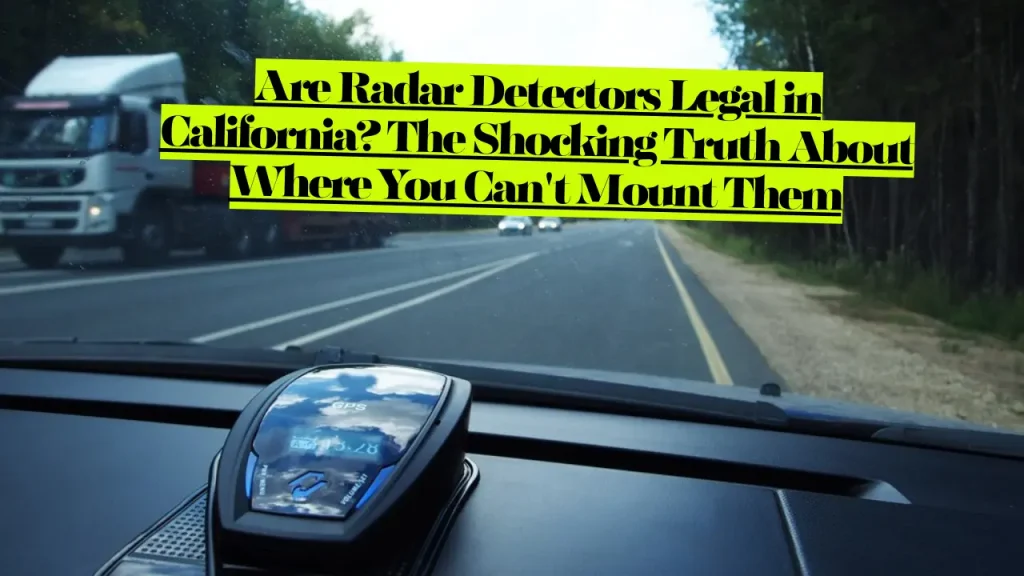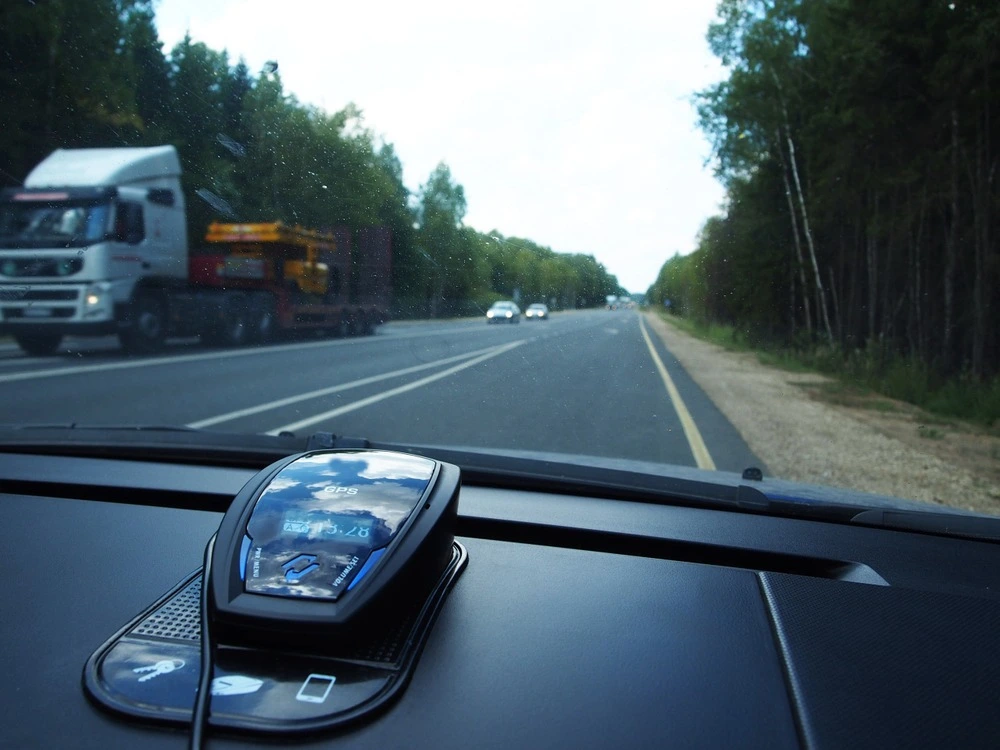Are Radar Detectors Legal in California? The Shocking Truth About Where You Can’t Mount Them
Yes—but there’s a catch that gets thousands of drivers ticketed every year. Radar detectors are legal in California for private passenger vehicles, but California Vehicle Code Section 26708(a)(1) prohibits mounting them on your windshield. One wrong placement could cost you $200. Commercial vehicles over 10,000 pounds face an outright federal ban—no exceptions.
Are Radar Detectors Legal in California?
California has no law explicitly prohibiting radar detector ownership or use in private passenger vehicles. This makes California one of 48 states where drivers can legally use these devices without fear of criminal penalties.
Here’s the twist that catches most drivers off guard: the device is perfectly legal, but one improper mounting decision transforms your legal detector into a $200 traffic violation.
California Vehicle Code on Radar Detectors
Windshield Mounting Restriction
California Vehicle Code Section 26708(a)(1) states: “A person shall not drive any motor vehicle with any object or material placed, displayed, installed, affixed, or applied upon the windshield or side or rear windows”.
Section 26708(a)(2) further prohibits any object “that obstructs or reduces the driver’s clear view through the windshield or side windows”.
This law applies to radar detectors, GPS devices, dashcams, and any other equipment mounted on glass surfaces.
Commercial Vehicle Prohibition
Federal regulation 49 CFR § 392.71 prohibits radar detector use in commercial motor vehicles. The regulation states: “No driver shall use a radar detector in a commercial motor vehicle, or operate a commercial motor vehicle that is equipped with or contains any radar detector”.
This applies to vehicles with a gross vehicle weight rating (GVWR) of 10,001 pounds or more.

Restrictions and Exceptions
Who Cannot Use Radar Detectors in California
Commercial drivers: Any motor vehicle weighing over 10,000 pounds cannot legally use a radar detector, even if the device is turned off.
Taxi and rideshare drivers: Taxi operators and rideshare drivers including Uber and Lyft are prohibited from having radar detectors.
Military bases: No driver can use a radar detector when driving through a military base, even if lawfully allowed to have one in the vehicle. The device must be turned off.
Legal Mounting Options
Dashboard or console placement is the safest legal option for California drivers. Specialized rearview mirror brackets that attach to the mirror stem rather than the windshield are also compliant.
Key mounting locations:
- Dashboard surface (not obstructing view)
- Center console
- Custom brackets attached to vehicle interior (not windshield)
- Rearview mirror stem mounts
Commercial Vehicle Rules
The Federal Motor Carrier Safety Administration (FMCSA) prohibits radar detectors in all commercial vehicles over 10,000 pounds nationwide, regardless of which state they’re operating in.
This prohibition applies not just to actively using a detector but even to having one in the vehicle. Even if the device is turned off, a commercial driver could face a ticket and fine for having a radar detector in the vehicle.
Radar Jammers vs. Radar Detectors
The $50,000 Mistake You Can’t Afford to Make
Radar detectors are passive devices that simply alert you to the presence of radar signals and are legal for private vehicles in California.
Radar jammers are active devices designed to transmit signals that interfere with police radar equipment, essentially “jamming” their ability to measure speed accurately, and are illegal throughout the United States under federal law. The difference could cost you $50,000 in federal fines.
California’s Jammer Laws
California Vehicle Code Section 28150(a) prohibits any vehicle from being “equipped with any device that is designed for, or is capable of, jamming, scrambling, neutralizing, disabling, or otherwise interfering with radar, laser, or any other electronic device used by a law enforcement agency to measure the speed of moving objects”.
Section 28150(b) states: “No person shall use, buy, possess, manufacture, sell, or otherwise distribute any device that is designed for jamming, scrambling, neutralizing, disabling, or otherwise interfering with radar, laser, or any other electronic device used by a law enforcement agency”.
Laser jammers, which interfere with police LIDAR (Light Detection and Ranging) equipment, are specifically prohibited under California law.
Penalties for Illegal Use
Windshield Mounting Violations
Drivers caught with improperly mounted radar detectors may receive a fine of $25.00 and be ordered to remove the obstruction, or face an infraction charge with fines up to $197.00.
Fines for windshield obstruction violations typically range from $25 to $200, depending on circumstances. No points are assessed to your DMV driving record for Vehicle Code 26708 violations.
Jammer Penalties
Using a radar or laser jammer is an infraction in California. When a person possesses four or more jamming devices, the violation escalates to a misdemeanor.
Infractions for using fewer than four devices can result in fines up to $250. Misdemeanor convictions for possessing four or more jammers may result in up to 6 months or 364 days in local jail and fines up to $1,000.
Federal charges for using radar jammers can result in substantial fines up to $50,000 and even imprisonment in serious cases, as the FCC aggressively enforces regulations against devices that interfere with authorized radio communications.

How California Law Differs from Federal Law
Federal vs. State Jurisdiction
California state law does not explicitly prohibit radar detector use, while federal law under 49 CFR § 392.71 specifically bans them in commercial vehicles nationwide.
The windshield mounting restriction comes from California state law, not federal regulations. California Vehicle Code Section 26708 is a state-specific obstruction law that applies to all objects on windshields, not just radar detectors.
Federal Communications Commission (FCC)
The Federal Communications Commission administers regulations against radar jammers under federal law, classifying them as “malicious interference” because they can disrupt authorized radio communications including airplane signals.
Enforcement and Practical Considerations
Police Detection Methods
In Virginia and Washington DC, the only jurisdictions that completely prohibit radar detectors, police can use radar detector detectors (RDDs) to identify vehicles using these prohibited devices. California law enforcement does not routinely use RDDs since detectors are legal for private vehicles.
Traffic Stop Scenarios
If pulled over with a radar detector mounted on your windshield, officers may issue a fix-it ticket for violation of California’s obstruction law. Visible or poorly mounted units can invite extra scrutiny from law enforcement during traffic stops.
An object hanging from the rearview mirror does not provide sufficient grounds for detention unless the police officer has an objectively reasonable basis to believe the object is obstructing or reducing the driver’s clear view.
Impact on Accident Claims
If you get involved in a car accident with a radar detector installed in your vehicle, this could potentially be used as evidence to establish a liability claim based on allegations of speeding. An injury lawyer may use the fact that a driver has a radar detector to demonstrate a speeding habit, which could speak to the driver’s character and driving behaviors.
Recent Legal Changes
California Vehicle Code Section 26708 was most recently amended by Stats. 2017, Chapter 210, Sec. 1 (AB 1303), effective January 1, 2018. No major changes to radar detector legality have occurred since then.
The law remains stable: detectors are legal for private vehicles, illegal for commercial vehicles, and cannot be mounted on windshields regardless of vehicle type.
FAQ: Common Questions About Radar Detectors in California
Can I mount my radar detector on my windshield in California?
No. California Vehicle Code Section 26708(a)(1) prohibits placing any object on the windshield that obstructs the driver’s view. Mount your detector on the dashboard, console, or rearview mirror stem instead.
Are radar detectors illegal in commercial trucks in California?
Yes. Any commercial vehicle over 10,000 pounds GVWR cannot use a radar detector under federal law 49 CFR § 392.71. This prohibition applies nationwide, not just in California.
What’s the difference between a radar detector and a radar jammer?
Radar detectors passively receive radar signals to alert drivers, while radar jammers actively transmit interfering signals to disrupt police radar equipment. Detectors are legal in California for private vehicles; jammers are illegal everywhere in the United States.
Are laser jammers legal in California?
No. California law specifically prohibits laser jammers under Vehicle Code Section 28150, which bans any device designed to interfere with law enforcement speed measurement equipment.
What happens if I get caught with a radar detector improperly mounted?
You may receive a fix-it ticket for windshield obstruction with fines ranging from $25 to $200. Officers may also pay increased attention during the traffic stop if the device is visible.
Can Uber or Lyft drivers use radar detectors in California?
No. Rideshare drivers including Uber and Lyft operators are prohibited from having radar detectors in California. The restriction aims to discourage dangerous speeding by drivers responsible for transporting passengers.
Where are radar detectors completely illegal?
Virginia and Washington DC are the only jurisdictions in the United States that completely prohibit radar detectors for all vehicles. In Virginia, fines can exceed $250, and police can use radar detector detectors to identify prohibited devices.
Legal Disclaimer: This article provides legal information about radar detector laws in California based on current California Vehicle Code provisions and official legal sources. It is for educational purposes only and does not constitute legal advice. Laws are subject to change. For specific legal advice regarding your situation, please consult with a qualified California attorney. Always verify current law through official California legal resources.
Related Articles:
- Is Lane Splitting Legal in Florida?
- Legal BAC Limit Over 21: Current DUI Laws
- Is Open Carry Legal in Florida? 2025 Law Update
About the Author

Sarah Klein, JD, is a licensed attorney and legal content strategist with over 12 years of experience across civil, criminal, family, and regulatory law. At All About Lawyer, she covers a wide range of legal topics — from high-profile lawsuits and courtroom stories to state traffic laws and everyday legal questions — all with a focus on accuracy, clarity, and public understanding.
Her writing blends real legal insight with plain-English explanations, helping readers stay informed and legally aware.
Read more about Sarah
